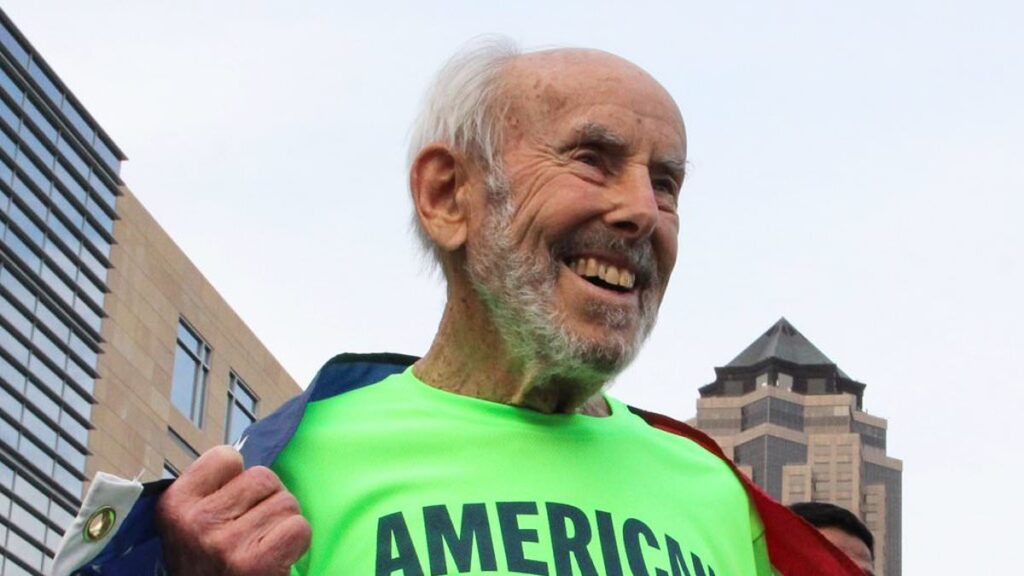
A 103-year-old marathon runner from Cincinnati, Ohio, has stunned the medical community by claiming he halted the spread of his cancer through a radical dietary change. Mike Fremont, diagnosed with stage 3 colon cancer at 69, defied doctors’ recommendations for conventional treatments and instead adopted a strict vegan diet.
Doctors at the Cleveland Clinic had warned Fremont that without chemotherapy, radiotherapy, and surgery, the disease would likely claim his life within three months. At the time, the cancer had metastasized to his lymph nodes, a stage that, while potentially curable, carries a high risk of becoming terminal. Despite this, Fremont chose to forgo traditional treatments in favor of a diet rich in whole foods such as sweet and white potatoes, tofu, leafy greens, legumes, fruits, and non-dairy milks.
Fremont asserts that this plant-based lifestyle not only halted the cancer’s spread but also led to his eventual recovery. Two years post-diagnosis, he underwent surgery to remove the tumor and has reportedly been cancer-free since. However, medical professionals remain skeptical, emphasizing that diet alone cannot replace the efficacy of chemotherapy or immunotherapy.
Medical Skepticism and Alternative Treatments
While Fremont credits his recovery to his diet, the medical community urges caution. “A nutritious diet should be used along with proper treatments in cancer patients, but diet alone absolutely cannot cure cancer,” stated Dr. Heber, an expert in oncology nutrition.
This skepticism is not unfounded. A 2023 study revealed that 70 percent of cancer patients use alternative medicine, with one in three relying solely on these methods, often without informing their oncologists. Such practices concern experts who fear patients may forgo life-saving treatments.
“Without treatment, survival rates drop to just 44 percent after three years, making medical intervention absolutely crucial.”
Fremont’s Life and Legacy
Fremont’s story is not just one of defiance but also of resilience. A former Yale University wrestler, he turned to running in the 1970s to cope with the loss of his wife. His first marathon was the 1972 Boston Marathon, and he has since set world records in various age categories.
Reflecting on his diagnosis, Fremont recalled, “I contracted a cancer which the Cleveland Clinic said would kill me in 3 months unless operated upon. I said no, I was going on a diet!” His decision to avoid conventional treatment was bold, and he attributes his longevity and health to his disciplined lifestyle.
Fremont’s daily regimen includes running five miles three times a week and maintaining a diet of oatmeal with blueberries, beans, and broccoli. He also abstains from alcohol and smoking, factors he believes contribute to his well-being.
The Role of Diet and Exercise in Cancer Prevention
Research supports the benefits of a healthy lifestyle in cancer prevention and recurrence reduction. For instance, a structured exercise program for stage II and III colon cancer patients has been shown to reduce recurrence by 28 percent and lower mortality risk by 37 percent over eight years.
Focusing on whole, unprocessed plant foods can reduce inflammation, a key factor in cancer development. These dietary choices also support healthy weight, cholesterol levels, and blood sugar control, all of which contribute to a lower cancer risk.
“Data from JAMA Surgery showed colon cancer is expected to rise by 90 percent in people ages 20 to 34 by 2030.”
The Debate Continues
Fremont’s case adds to the ongoing debate about the role of alternative treatments in cancer care. While his story is remarkable, experts caution against viewing diet as a standalone cure. The consensus remains that while a healthy lifestyle is beneficial, it should complement, not replace, medical treatments.
As Fremont continues to defy age and illness, his story serves as a testament to the power of perseverance and the potential benefits of a healthy lifestyle. However, it also underscores the importance of informed medical decisions and the need for ongoing research into cancer treatments.







